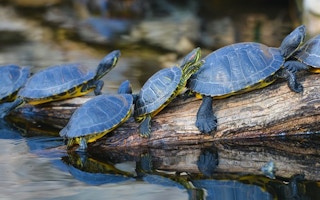Scientists in California have identified a cold-blooded killer as global warming brings new hazards for ectotherms − creatures that cannot regulate their own body heat.
The suggestion may seem counter-intuitive, as vipers, lizards, fish and frogs all depend on ambient warmth to keep their metabolisms busy. But while endotherms – among them mammals − have ways of keeping themselves cool on hot days, lizards and their like might not be so flexible and could overheat.
Alex Gunderson and Jonathon Stillman, biologists at the Romberg Tiburon Centre for Environmental Studies at San Francisco State University, report in the Proceedings of the Royal Society B that they tested their suspicions about overheating risks by combing through 112 published studies that delivered 394 estimates of potential temperature tolerance in 232 species of ectotherm − laboratory species that had been tested in extremes of hot and cold.
Their sample of the cold-blooded living things included amphibians, reptiles, crustaceans and insects, land-dwellers and water-dwellers.
Climate swings
They found evidence that all had some ability to acclimate – that is, adapt to different temperatures – and some, such as fish, crab, lobster and shrimp, had more tolerance to acclimation than others. But, overall, many of them proved less likely to tolerate increasingly extreme climate swings.
“Because animals have some ability to acclimate to higher temperatures, scientists hoped that they might be able to adjust their physiology to keep up with global warming,” Dr Gunderson says.
“We found by compiling these data in the first large-scale study of hundreds of different animals that the amount they can actually adjust is pretty low. They don‘t have the flexibility in heat tolerance to keep up with global warming.”
“
We found by compiling these data in the first large-scale study of hundreds of different animals that the amount they can actually adjust is pretty low. They don‘t have the flexibility in heat tolerance to keep up with global warming.
Dr Alex Gunderson, biologist at the Romberg Tiburon Centre for Environmental Studies at San Francisco State University
Global warming and attendant climate change is believed to threaten one species in six with extinction. It can do this by amplifying and adding to a range of existing hazards, threats and pressures such as habitat destruction, or over-hunting, or by changing in a few decades a wholeclimatic regime to which species have adapted over tens of thousands of years.
When the heat is on, wild creatures have three choices: they can migrate away to cooler latitudes, move uphill to cooler temperatures, or they can adapt. But global average temperatures might be rising too fast to permit many animals to evolve a greater range of heat tolerance.
Evolutionary change
“Our results suggest that their ability to acclimate to increasing temperatures will not buffer them from the changes that are occurring, and that they are going to have to depend on behavioural or evolutionary change to persist,” Dr Gunderson says.
In general, the scientists found that although some species could acclimate to higher temperatures, this left them with a lower margin of safety. This mean that an animal comfortable at 20°C might be able to survive at 30°C, but when it became acclimatised to 25°C then it might perish at 32°C.
Unexpectedly, although animals that evolved in the higher latitudes were accustomed to more dramatic swings in temperature than those in the tropics, this did not deliver a greater capacity to deal with even more extremes of heat. Canadian ectotherms, for example, showed no more ability to survive unusual heat than those in the tropics.
“Ectotherms are very much at the mercy of their environments,” Dr Gunderson says. “Now we see that their ability to acclimate to hotter temperatures is unlikely to keep them in the game. They will have to depend on other strategies.”

















